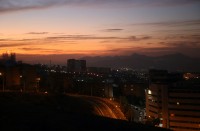by Ammar Karim
Baghdad, Iraq (AFP) — Iraqi forces killed at least two protesters while defending Baghdad’s Green Zone, officials said on Saturday, as the troubled country’s leaders warned against further escalation.
The two supporters of Moqtada al-Sadr were the first casualties of the months-old protest movement started by the young cleric to push for political change.
They were interred in the holy city of Najaf, which is home to the world’s largest cemetery where millions of people from Iraq’s Shiite majority are buried.
“The victims were buried… in Wadi al-Salam (Valley of Peace) cemetery,” said Sheikh Imad al-Kaabi, an official in the Sadr Movement.
During the funeral, a relative of one of the deceased accused the state of using excessive force.
“Peaceful protesters were exposed to the fire of live and rubber bullets and tear gas,” said the man, who gave his name as Abu Mohammed.
Friday saw the worst eruption of violence since Sadr, the scion of an influential clerical family from Najaf, ordered his many followers to take to the streets to demand reforms.
His supporters confronted the security forces and broke into the Green Zone, a sprawling fortified district in central Baghdad that hosts most of the country’s top institutions.
A small group managed to storm Prime Minister Haider al-Abadi’s office. They quickly pulled out.
The protesters faced a barrage of tear gas fire and generally stiffer resistance than three weeks earlier, when they broke into the Green Zone for the first time and stormed parliament.
Security and medical officials also said at least 57 people were wounded in Friday’s unrest, during which forces also used water cannons and sound bombs against protesters, some of whom threw rocks and other debris.
Security forces also fired live rounds during the demonstration, mostly into the air, but officials said at least two protesters had died of bullet wounds.
– Few options –
Abadi reacted to the latest breach by saying that “storming state institutions… cannot be accepted”, but added that he supports the “demands of the peaceful protesters”.
Sadr vowed Friday that “peaceful protests” would continue, warning that “the revolution will take another form” if there are attempts to block them.
Abadi has made several attempts to push through reforms aimed at curbing corruption and spending since he took the country’s top job in 2014.
His latest plan was to replace the current government of party-affiliated ministers with a cabinet of technocrats.
But he has faced resistance from key players, including within his own party, who are reluctant to give on a system of patronage that is the very source of their power.
Sadr ostensibly supports Abadi’s reform but every security breach in the Green Zone has made the premier look weaker and infuriated rival Shiite groups.
Parliament has failed to reconvene since protesters stormed it late last month. A session had been slated for this coming Thursday but Friday’s fresh breach raises questions over where to hold it.
That leaves Abadi with few options, with tensions growing between Shiite armed groups even as Iraqi forces prepare for their most daunting military operations against the Islamic State group yet.
“Restoring calm is key for Iraq to be able to move forward in finding a political solution based on inclusive consultations,” said Jan Kubis, the UN’s special envoy to Iraq.
But Kimberley Kagan, who heads the Institute for the Study of War, argued that the political crisis had deepened too much for all sides to agree on a face-saving solution.
“This conflict will protract and there will be winners and losers,” she said.
A two-hour curfew was slapped on Baghdad on Friday as riots wound up near the Green Zone, amid reports that Sadr’s armed organisation and militia groups were on the brink of a dangerous face-off.
© 1994-2016 Agence France-Presse








